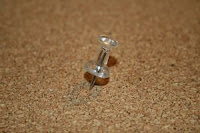 I watched The Sixth Sense again two nights ago. First, I suppose I should raise the obligatory red spoiler flag, although you'd have to have lived under a rock the past nine years to not know about one of the best plot twists ever put to film.
I watched The Sixth Sense again two nights ago. First, I suppose I should raise the obligatory red spoiler flag, although you'd have to have lived under a rock the past nine years to not know about one of the best plot twists ever put to film.I'm fascinated with the unreliable narrator concept. I believe that we are the unreliable narrators of our own lives. Our experiences, emotions, values, fears-every aspect of our inner story is a veritable 64 Crayola box of shades and truths.
As my final pages loom, I worry about the predictability of my ending. Is it possible the story I've lived with for nine months, one as familiar to me as the scratches on my maple desk, is just as transparent to a new reader? Has the complete reveal of the story become so tiresome that I crave a mind-bending twist to wake up my weary imagination? I'm tempted.
As my final pages loom, I worry about the predictability of my ending. Is it possible the story I've lived with for nine months, one as familiar to me as the scratches on my maple desk, is just as transparent to a new reader? Has the complete reveal of the story become so tiresome that I crave a mind-bending twist to wake up my weary imagination? I'm tempted.
In my previous novel, Chasing Midnight, I experimented with an unreliable narrator and it worked. Completely and, I hope, memorably. Will this become a signature of mine? Things not always what they seem?
Writer and director M. Night Shyamalan is the crown prince of unreliable narration. In The Sixth Sense, Bruce Willis' character, Dr. Malcolm Crowe, does not arrive at the truth of his own death until the movie's final scene. The audience feels the impact alongside Malcolm, a moment of ultimate identification and perfect oneness with the character. In Shyamalan's 2004 film, The Village, Lucas and Ivy prove unreliable as the truth about the community is revealed. The result is a richer understanding of motivation and character than if the story had been told from the elder's viewpoint.
Memento, Donnie Darko and an entire list of some of my favorite movies use unreliable narrators. It reminds me of old episodes of The Twilight Zone I would lap up when I was ten where the characters suddenly realized they were figurines in a dollhouse or part of a small microcosm in an alien world. Maybe a bit deus ex machina so prevalent in science fiction of the time, but the reversal of perspective is a theme I gravitate to. Even Lost has dipped its toes into this form of narrative twist. But do audiences ever feel betrayed?
Writers enter into an emotional contract with the reader in the first few pages and build a healthy relationship of trust. Just as writers want to create a tale worthy of the paper on which it's printed, readers want to immerse themselves in a story worthy of their expectations.
Is a twist so monumental that it has the capacity to upend every thread, every realization to that moment, the ultimate betrayal of that trust?
Chime in...









